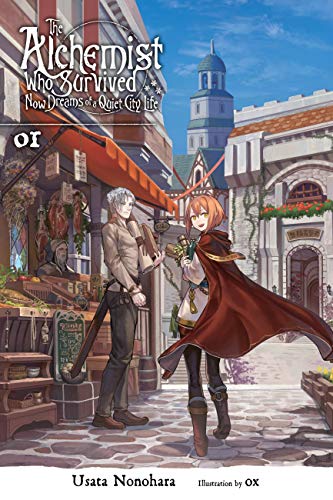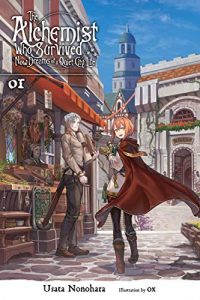By Usata Nonohara and ox. Released in Japan as “Ikinokori Renkinjutsushi wa Machi de Shizuka ni Kurashitai” by Kadokawa Shoten. Released in North America by Yen On. Translated by Erin Husson.
It’s possible that I simply have overinflated expectations for slow life titles with a female protagonist, but I must admit that I found this book a big old grab bag of good stuff and bad stuff, with in the end the bad outweighing the good a bit. I am reminded once again that there is a roadmap these fantasy light novels follow, and much as we as readers would like them to forge a new path they are absolutely going to stay on the well-traveled road. And that means we get slavery here, along with the heroine not really caring about it (she’s not reincarnated from Japan, though, so gets a bit more of a pass). It means we get more “her breasts are huge and I am sad that mine are not” descriptions, some of which verge on the ridiculous. And it means endless, truly endless descriptions of alchemical recipes, as if this were a foodie title. Sometimes worldbuilding can be boring.
Mariela is a young, relatively poor alchemist in a city with quite a few of them, living in a cabin in the woods while waiting for her Master to return. Then there’s a monster stampede killing everyone in its path. To survive, she puts herself in suspended animation… but forgets she’s in a hole in the ground, so her candle goes out and the spell lasts for two hundred years. Now awake again, she finds that alchemy has mostly died off, and that potions are highly prized. She decides to make a new life for herself in the city, hiding her real profession but opening an apothecary so she can be as close to it as possible. With the help of Siegmund, a slave she purchased on impulse who turns out to clean up very nicely, and a bunch of friendly soldiers and innkeepers, she resolves to live her slow life in a world that, to her, is the far future.
Great premise, and it has to be said Mariela is the best thing about the title. An odd combination of savvy and stunningly naive, you can see why she tends to worry people around her. She describes herself as just your average alchemist, but it’s pretty clear her Master was a genius, and Mariela was well on her way to surpassing that. Unfortunately, her treatment of Sieg, which is basically “I bought him as a slave and order him around for everyday household tasks but like to think we are the bestest of friends!” is cringeworthy. More to the point, this volume desperately needed an editor. Not on the Western side, Yen’s version is fine, but on the Japanese side. It’s a very long book, and future volumes in the series are just as long or longer. A good half of the book is Mariela describing in detail her alchemical processes and why you need this herb or that monster ingredient. I’ve mentioned that I dislike the “stat descriptions” in game based isekai. This is a normal fantasy, but may be just as bad. A lot of these Syosetsu webnovels need to have their wordcount culled before publication.
Again, problematic as she is, I liked Mariela, and will likely try a second volume. But honestly, I recommend this for those who REALLY love immersing themselves in worldbuilding and want to know exactly what steps to take to be an alchemist.


Hmm, sounds like the manga culled all the right bits, I quite enjoyed the manga, which didn’t go into any unnecessary details on making potions (sure, she mentioned wanting a few things, but at least they came off as plot relevant and not overly long). I’m also sure there were no breast size comparisons. I also don’t recall her using Sieg to do pointless household tasks either., She treats him kindly and like a genuine human, usually only ordering him to accept her treatments (which he is quite hesitant of at first). Then again, I also don’t know how far the first manga got into the first novel. But the manga feels like it can do its world-building without naming every ingredient just fine, so I’ll just stick with the manga on this series. Who knows, maybe the first manga did manage to do the entire first novel, if there was that much that could be easily left on the cutting floor. I’d be curious what you think of the manga in comparison